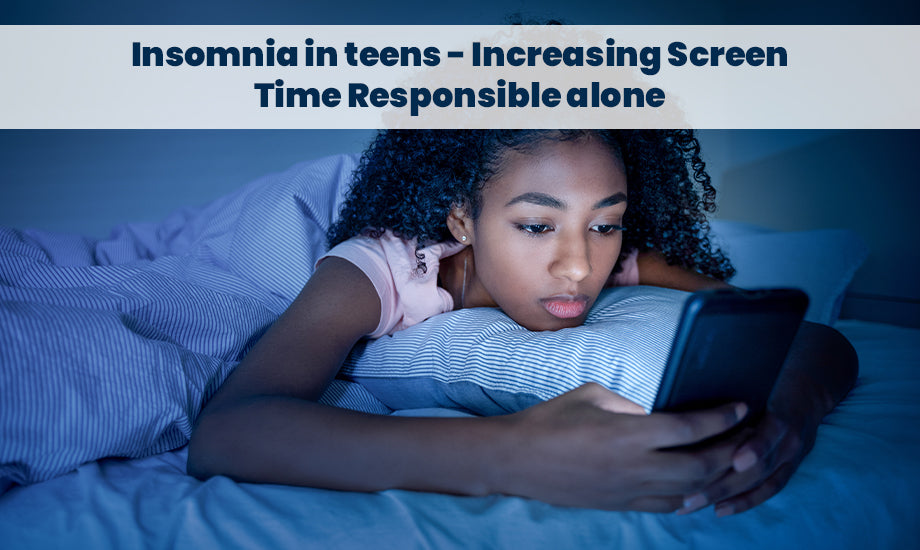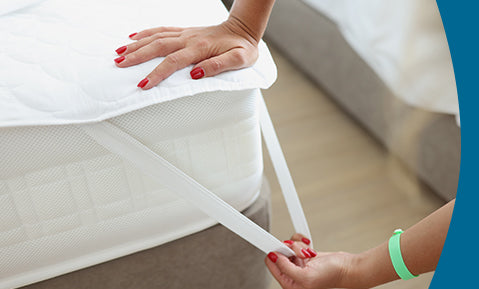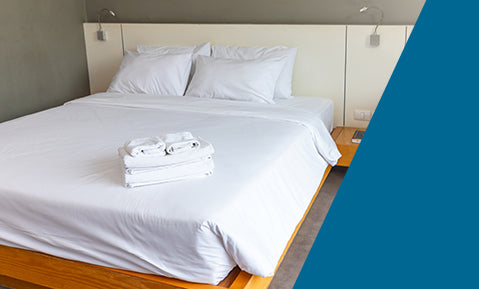
Can we agree that an increased screen time among teenagers is one leading factor in Insomnia in Teens? Some kind of technology sneaks into 96% of American teenagers (15 to17) bedroom every-night. According to a Modern Family poll, in 2014 on behalf of NSF - The National Sleep Foundation asserts that an average adolescent consumes around 9 hours of screen time, every day. Although technology is inevitable, one must have some lines drawn as far tech ruling our lives is concerned. The blue lights emitting from these devices are increasingly impacting an average teenager’s sleeping and waking cycle.
Insomnia can significantly impact a person's physical and mental health and affect their daily functioning and quality of life. Every 2 out of the third teenagers sleep less than what is prescribed by physicians. Why? The screen time alone can be blamed, there are other factors as well.
Other Reasons of Prevalence of insomnia in teens
Insomnia is a common sleep disorder that can affect people of all ages, including teenagers. Insomnia can significantly impact a teenager's physical and mental health and affect their daily functioning and quality of life.
Factors contributing to the insomnia prevalence among teenagers:

- Stress and anxiety - Stress and anxiety are common causes of insomnia in teenagers. Stressors such as school, relationships, and extracurricular activities can all contribute to difficulty sleeping. Stress and anxiety can interfere with sleep by activating the body's "fight or flight" response, which can increase heart rate, blood pressure, and levels of the stress hormone cortisol.
- Poor sleep habits - Insomnia, or difficulty falling or staying asleep, is a common problem among teenagers. There are a number of potential causes of insomnia in teens, including poor sleep habits. Poor sleep habits can include:
● Staying up late: Teens often have late bedtimes due to school, homework, extracurricular activities, or socializing with friends.
● Using electronics before bed: The blue light emitted by screens can disrupt the production of melatonin, a hormone that helps regulate sleep.
● Consuming caffeine or other stimulants: Caffeine and other stimulants, such as energy drinks or tobacco, can interfere with sleep.

- Medical conditions - Teenagers frequently struggle with insomnia, which is the inability to fall or stay asleep. There are times when underlying medical issues can contribute to insomnia. Teens may experience insomnia due to a variety of medical issues, such as:

3.1 Mental health disorders: Anxiety, depression, and other mental health disorders can disrupt sleep.
3.2 Chronic pain: Physical discomfort or pain can make it difficult to fall or stay asleep.
3.3 Sleep disorders: Sleep disorders such as sleep apnea, restless leg syndrome, and Narcolepsy can interfere with sleep.
3.4 Medical conditions: Certain medical conditions, such as asthma, allergies, and gastrointestinal issues can cause sleep problems.
● Medications: Some medications, including stimulants and certain antidepressants, can disrupt sleep.
- Genes- Genetics Studies have found that certain genes may increase the likelihood of developing insomnia. However, it's important to remember that genetics is just one factor that can lead to insomnia. Other stress, medical conditions, and certain medications may also contribute.
- Insomnia due to Medication affection by causing variety of medical conditions or other factor. Some possible causes of insomnia in teenagers include:
- Depression, anxiety, and ADHD are examples of mental health issues.
- Chronic pain conditions
- Endocrine disorders, such as hyperthyroidism or diabetes
- Asthma and sleep apnea are examples of breathing issues.
- Heart or circulatory problems
- Neurological conditions, such as epilepsy or multiple sclerosis
- Medications, such as certain antidepressants or stimulants
- Lead your sleep - Good sleep is essential for the health and well-being of teenagers. Lack of sleep can affect their emotional state and overall quality of life. It is also a significant factor in car accidents among teenagers. Therefore, it is important to prioritize and prioritize good sleep for your teenager.
- Be Wary of Sleep-Disturbing Tendencies - There are several habits or tendencies that can disturb sleep and it is important to be aware of them in order to get good sleep. Some common sleep-disturbing tendencies include:
- Eating a large meal or exercising close to bedtime: These activities can stimulate the body and make it difficult to fall asleep.
- Being too hot or too cold: A comfortable room temperature is important for good sleep.
By being aware of these sleep-disturbing tendencies and taking steps to address them, you can improve your sleep and wake up feeling rested and refreshed.
Good sleep is essential for the health and well-being of teenagers. There are several strategies that can help teens get the sleep they need:
- Establish a consistent bedtime routine: This can help signal to the body that it is time to wind down and prepare for sleep.
- Make the bedroom a comfortable sleep environment: This can include keeping the room cool, dark, and quiet, and using a comfortable mattress and pillows.
- Practice relaxation techniques: Techniques such as deep breathing, progressive muscle relaxation, or meditation can help you relax and reduce stress.
- Establish a regular sleep schedule: Going to bed and waking up at the same time daily can help regulate your body's sleep-wake cycle.
How to combat the screen time bit?

- Maintain a screen time schedule: Limiting screen time can be an effective way for teenagers to improve their sleep. Here are some tips for limiting screen time before bed:
- Set a screen time limit: Determine a reasonable amount of screen time for your teenager each day and set a timer to help them stick to it.
- Establish a screen-free zone: Designate a specific area of the house, such as the bedroom, as a screen-free zone.
- Turn off screens at least an hour before bed: The blue light emitted by screens can disrupt the body's natural sleep-wake cycle, so it is important to turn off screens well before bedtime.
To summarize, good sleep is essential for the health and well-being of teenagers and for that dependency on screen time needs to be controlled. There are several strategies that can help teens get the sleep they need, such as establishing a consistent bedtime routine, creating a comfortable sleep environment, and caffeine before bed. By prioritizing good sleep, teenagers can improve their overall health and well-being.












